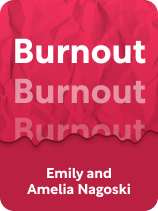

This article is an excerpt from the Shortform book guide to "Burnout" by Emily Nagoski and Amelia Nagoski. Shortform has the world's best summaries and analyses of books you should be reading.
Like this article? Sign up for a free trial here.
How can you get rid of cortisol? Why does cortisol make you feel more stressed?
Cortisol is your body’s main stress hormone. Cortisol elevates when you experience stress and anxiety, but luckily there are a few ways to reduce these uneasy feelings.
Check out Amelia and Emily Nagoski’s (the authors of Burnout) three techniques to learn how to get rid of cortisol.
Dissipate Your Stress Hormones
The authors assert that to learn how to get rid of cortisol, we must mimic our body’s natural response to stress. They elaborate that our stress response cycle developed to help early humans survive, so to complete the stress cycle, we need to respond as early humans did.
When our ancient ancestors faced threats (stressors), they took action—they ran, hunted, screamed, and gathered together. While the stressors modern humans face aren’t the same, the way our body processes a neutralized threat is. The authors assert that based on these primal responses, there are three main ways we can dissipate our stress: by exerting energy, connecting with others, and practicing wellness.
(Shortform note: In The Willpower Instinct, Kelly McGonigal seconds the authors’ assertion that we should relieve stress by mimicking our primal fight or flight response and doing things like exercising, connecting with others, and practicing wellness. However, she warns that the modern stressors we face often point us toward harmful stress relief activities like smoking, drinking, gambling, eating, or shopping. While these may provide short-term stress relief, they don’t actually eliminate the stress, just temporarily dull it. If you find yourself turning toward these activities when you’re stressed, you’re probably doing more harm than good and increasing your chances of burnout.)
Technique #1: Release Energy
The authors explain that releasing energy, like engaging in physical activity, is the most effective way to dissipate stress hormones. This is because the most common response to stress for primal humans was to run, fight, or yell. They elaborate that 20 to 60 minutes of physical exertion (anything that gets your heart rate up) a day should be enough to release your stress. If you don’t have time for this, you can alternatively release your energy by screaming into a pillow, having a good cry, or tensing and relaxing your muscles for a few minutes.
Technique #2: Connect With Others
Connecting with others and sharing affection is another effective way to dissipate stress. The authors say that interacting regularly with others is beneficial, but that interacting with people whom you love and trust is even better. They state that sharing a six-second kiss or hugging for 20 seconds is proven to lower your blood pressure and heart rate, improve your mood, and get rid of nasty stress hormones. Even cuddling with your pets or chatting with an acquaintance can help.
Technique #3: Practice Wellness
Finally, the authors explain that practicing wellness can help dissipate your stress hormones. They recommend practicing a one-minute breathing exercise—breathe in slowly and deeply for five seconds, hold for five seconds, and then breathe out slowly and completely for ten seconds, repeating the process three times total. You should also try to regularly do things that make you happy, like laughing, meditating, talking to friends, or expressing yourself creatively.

———End of Preview———
Like what you just read? Read the rest of the world's best book summary and analysis of Emily Nagoski and Amelia Nagoski's "Burnout" at Shortform.
Here's what you'll find in our full Burnout summary:
- Why women are more likely to suffer physical, mental, and emotional burnout in today's society
- How women can handle these stressors and thrive
- How to recover from burnout and get back on your feet






